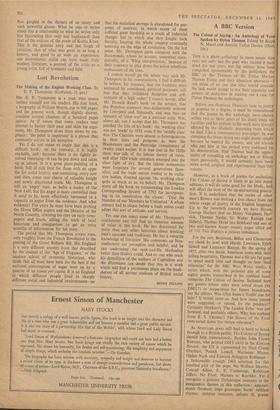Lost Revolution
MR. E. P. THOMPSON is a man who spares neither himself nor his readers. His first book, a biography of William Morris, ran to 900 pages; and the present work, though slightly shorter, contains several chapters of a hundred pages apiece. As if aware that some readers may attempt to hasten their pace and skim his argu- ment, Mr. Thompson slows them down by em- phasis: 'the point is important' is a phrase that constantly occurs in his narrative.
Yet I do not mean to imply that this is a difficult book: on the contrary, it is highly readable, and—because there is no tightly in- volved theorising—it can be put down and taken up at leisure. It is a great plum-pudding of a book, full of rich fruit for those with an appe- tite for social history, and containing, every now and then, some rare charm of valuable insight and newly discovered truth. Mr. Thompson is still an 'angry' man, as befits a leader of the New Left; but his anger is more controlled than it used to ,be, more effectively harnessed to a capacity to argue from the evidence. And what evidence! For years he must have been probing the Home Office papers and the libraries of the North Country, straining his eyes on early news- papers and tracts, sifting the work of local historians and antiquarians to get art extra scintilla of information for his story.
The period that Mr. Thompson covers runs, very roughly, from the French Revolution to the passing of the Great Reform Bill. His England is a very different country from that described by the student of the 'Age of Elegance,' or the modern school of economic historians, who think that all must have been for the best if the national consumption of sugar went up by a quarter of an ounce per capita. It is an England in which different people lived in sharply different social and industrial environments—so that the statistical average is abandoned for pur- poses of analysis; in which many of them suffered great hardship as a result of industrial change; but in which also they fought back fiercely, keeping the whole country constantly teetering on the edge of revolution. On the last point, Mr. Thompson parts company with the Hammonds, whom he accuses, somewhat unex- pectedly, of a 'Whig interpretation,' because of their tendency to play down the active rebellious enthusiasm of the time.
I cannot myself go the whole way with Mr. Thompson in his reassessments. I find it difficult to believe, for instance, that the Luddites were animated by considered, political purposes, still less that they 'exhibited discipline and self- restraint of a high order.' I cannot accept, after Mr. Donald Read's book on the subject, that the Peterloo massacre was deliberately ordered by Liverpool and Sidmouth, and was thus an instance of 'class war' on a national scale. Nor, above all, can I accept that Mr. Thompson has justified the title of his book: the 'working class' was not 'made' by 1832, even if the 'middle class' was. The Chartists were almost as heterogeneous in their aims and purposes as were the Blanketeers and the Pentridge conspirators of twenty years earlier. It is true that in the 1820s there was- talk of the labour theory of value, and after 1824 trade unionism emerged into the clear light of day. But the labour economists were forgotten for several generations there- after, and the trade unions tended to be exclu- sive bodies, directed against 'the working class' quite as much as on its behalf. Mr. Thompson starts off his book by commending the London Corresponding Society of 1792 for incorporat- ing in its constitution the clause: 'That the Number of our Members be Unlimited.' A whole century had to elapse before a trade union could adopt this sort of attitude, and survive.
Yet one can reject some of Mr. Thompson's conclusions and still find an immense amount of value in this book. He has discovered far more than any other historian about working men's customs and traditions. He has a versatile knowledge of literature. His comments on Non- conformity are perceptive and helpful, and he can understand the rank-and-file Methodists better than Hal6vy could. And no one who reads his demolition of the authors of Capitalism and the Historians can doubt that this is a work which will find a permanent place on the book- shelves of all serious students of British social history.
HENRY PEI.LING






































 Previous page
Previous page